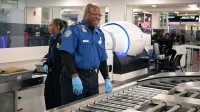 Administrator Pekoske testifies on Capitol Hill for full funding of TSA’s new pay plan in the FY24 federal budget.
Administrator Pekoske testifies on Capitol Hill for full funding of TSA’s new pay plan in the FY24 federal budget.
One year ago, on July 2, 2023, TSA’s Transportation Security Compensation Plan went into effect, bringing the agency’s pay in line with its counterparts across the federal government.
In March, Congress passed and the president signed into law the fiscal year 2024 federal budget package, fully funding TSA’s compensation plan.
“Paying you what you deserve has been the top priority for departmental and TSA leadership for years,” said Administrator David Pekoske in a March 21, 2024, broadcast to employees. “This pay plan – your pay plan – is well-deserved and was long overdue.”
TSA’s new pay plan covers all TSA employees from uniformed officers, vetting and intelligence analysts, inspectors, Federal Air Marshals (FAMs) and canine handlers to management and administrative professionals.
Since the new plan went into effect, TSA recruitment events are seeing record numbers of candidates for officers, FAMs and other jobs, along with a significantly higher number of job applicants on USAJOBS, the federal government’s official employment site. As of July 1, the agency received 328,590 applications for fiscal year 2024, compared to the less than 300,000 annual average.
Three members of TSA’s National Advisory Council (NAC), a top advisory group for the Administrator and his senior leadership team, weighed in on the one-year anniversary and the pay plan’s impact on TSA.
Kia Lane, a lead officer at Dallas Love Field, joined TSA in 2002, soon after the agency’s rollout, and agreed with the Administrator that the pay raise was long overdue.
“I feel that’s something we should have been getting in the beginning,” said Lane. “At first, I was skeptical with (Congress) actually passing it. But once they did, it was great. It definitely makes a difference.”
When asked if she thought this would ever happen, Lane replied, “I didn’t. It was a long time coming.”
Another TSA employee, Jay Roca, also launched his TSA career in the agency’s infancy in 2003. Going back to his early days as a part-time baggage officer at Oakland International Airport, he remembers the longtime feeling of being paid much less than his federal counterparts.
“There was this talk almost every week that we were working so hard, and we loved the company of people we worked with. Why couldn’t we get the same pay as our counterparts?” asked Roca, now a TSA officer at New York’s John F. Kennedy International Airport. “So, to know this went through, that it’s the anniversary, I kind of feel sadness, because some of our former employees stepped down (before the pay increase). They gave up. However, a lot of long-time TSA employees are now saying ‘thank you.’”
The latest figures from TSA’s Human Capital (HC) show more employees see longevity in their careers with TSA since the new pay plan went into effect.
TSA’s attrition rate has been cut nearly in half. It was 15.7% in 2022, dropped to 11.5% in 2023 and is 7.8% so far this year. Officer attrition went from 17.1% in 2022 to 12.5% in 2023 and is 8.6% this year.
With so many experienced TSA officers remaining with the agency, HC describes the numbers as “extraordinary.”
Susan Crooks, an 11-year TSA officer at North Carolina’s Concord-Padgett Regional Airport and union representative, is pleased TSA has come this far, but she feels the General Schedule (GS)-equivalent plan doesn’t go far enough. Most of the rest of the federal government is part of the GS scale, and although TSA’s current plan is a mirror image of GS, the agency is not officially on the GS scale.
Crooks doesn’t believe Congress would cut TSA employees’ pay but fears any agency funding cuts could impact retirement benefits or further raise health insurance premiums.
“It’s not into law,” she added. “It’s just like any other directive we get; it can change. It can go away if it’s not funded in the budget.”
The TSA Human Capital Compensation team said the agency’s pay plan brought TSA in alignment with GS through the appropriation process, not a directive.
“Additionally, the Administrator is on record saying TSA will not revert back to its old pay system, and early mark-ups of the FY25 federal budget show TSA’s pay plan to be fully funded,” said the HC team in a joint statement. “
Roca, Lane and Crooks all applaud Pekoske for fulfilling his pledge to bring pay equity to TSA and express their gratitude to DHS Secretary Alejandro Mayorkas for his commitment to TSA employees as well as Congressman Bennie Thompson, Ranking Member of the U.S. House Committee on Homeland Security, and the American Federation of Government Employees, TSA’s union for bargaining unit employees.
“Our officers are thrilled,” said Crooks. “They can pay their bills now. I had people at my airport who were single mothers, and they could not afford to live without government assistance on the old pay scale. They should be able to earn a living wage.”
Lane added, “It makes a difference. It’s a sigh of relief to be able to pay your bills and have something left over. I feel Administrator Pekoske cares. I appreciate his effort to get us to this point.”
Lane, Crooks and Roca plan to keep striving to further improve the agency, listen and make TSA an even better place to stay when it comes to developing careers.
“I’m thankful,” Roca proclaimed. “My destiny is to remain at TSA, and I’m thankful for this opportunity.”
By Don Wagner, TSA Strategic Communications & Public Affairs


